Written by: Sydney Brammer, Aidan Hatch, Nicholas Schonken, Ayla Ozturk, and Sherrie Clark
Edited by: Abigail Miller
Each year, students across California take multiple state-wide tests that allow parents, teachers, and educators to gauge a child’s grasp on the curriculum they have been learning. The California Assessment of Student Performance and Progress, or CAASPP, tests students in three subjects. English, mathematics, and science.
According to the CAASPP website, “Statewide summative assessments are required under the federal Every Student Succeeds Act (ESSA) to help provide consistent measures of student progress. These assessments are essential components of an equitable, valid, and balanced assessment system. More than ever, assessments are critical in providing student-level data to inform potential learning loss due to the disruption caused by the COVID-19 pandemic.”
Due to the hardships Visalia has faced over the Covid Pandemic, students, teachers, and members of the community are worried about how these test scores may not give an accurate representation of what VUSD students are capable of.
Dali Ozturk, Ph.D., an Education Research Professional and coauthor of An Asset-Based Approach to Latino Education in the US: Understanding Gaps and Advantages (2019), says that “with standardized testing, reliability, and validity are general issues but during a pandemic, the main concern is about student equity.”
At this time, “many students (and their families) do not have the necessary resources for remote learning including technology, materials, homework help, or a reasonable study space/place at home” says Ozturk.
Due to the ways that Covid has changed “the modality of instruction… standardized tests results will require appropriate context. If the results are used for accountability or evaluative purposes that lead to benefits or losses, student equity can be a major issue” Ozturk says. However, “If the results are used for improvement purposes including understanding learning loss and learning gap, standardized tests can provide some helpful information.”
ELEMENTARY SCHOOL
Lily Graves, a Visalia Unified School District (VUSD) elementary school parent says that she does not think “state testing is healthy or benefiting for students.”
Graves, who is married to a VUSD teacher, has an inside perspective on how much time state testing takes away from in class learning. ” I don’t think in this particular year, it is even fair to consider taking it, since scores will be very low due to the situations many students faced during distance learning.”
Because state testing will be an opt-in experience, Graves feels that her own child “will be fine knowing he doesn’t have to take it. I know children can get overly stressed when it comes to state testing as well as regular homework assignments and tests. As if this year wasn’t a stress in itself enough, I’d say the less stress the better for kids this year.”
Elementary school students are also feeling the effects of the possibility they will have to partake in the state testing.
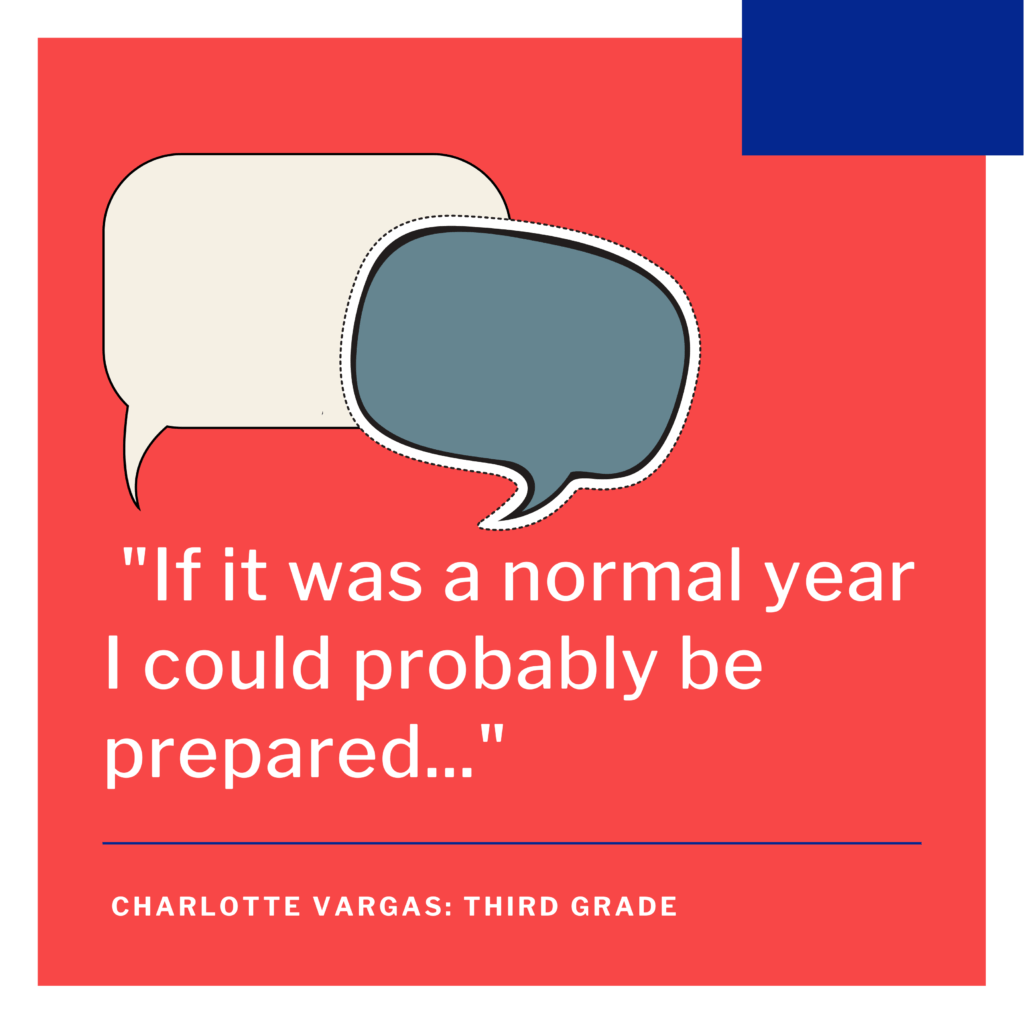
Reese Marquez, a fourth-grader, says “I don’t feel like it’s a good idea. Kids are stressed about staying healthy with Covid. We have also had to learn at such a fast pace which makes testing difficult. Things are much harder.”
Another elementary school student Charlotte Vargas, a third-grader, says that “if it was a normal year I could probably be prepared but, since it’s a covid year I’m not.”
Marilyn Clark, a K-3rd Special Ed teacher at Riverway has similar concerns. She worries that the pandemic will have a significant effect on students’ test scores and has been administering practice tests for at least a week until the day comes. Clark states that while the CAASPP test may be a good tool in the grand scheme of things, “it’s just a waste of time, especially with this pandemic”
MIDDLE SCHOOL
Gwyneth Miller, an 8th grader at Green Acres Middle School is also not planning on taking the CAASPP test because she feels “extremely unprepared” due to the circumstances of this year. She adds, “these tests will not affect our grades or our placement in any classes in high school.”
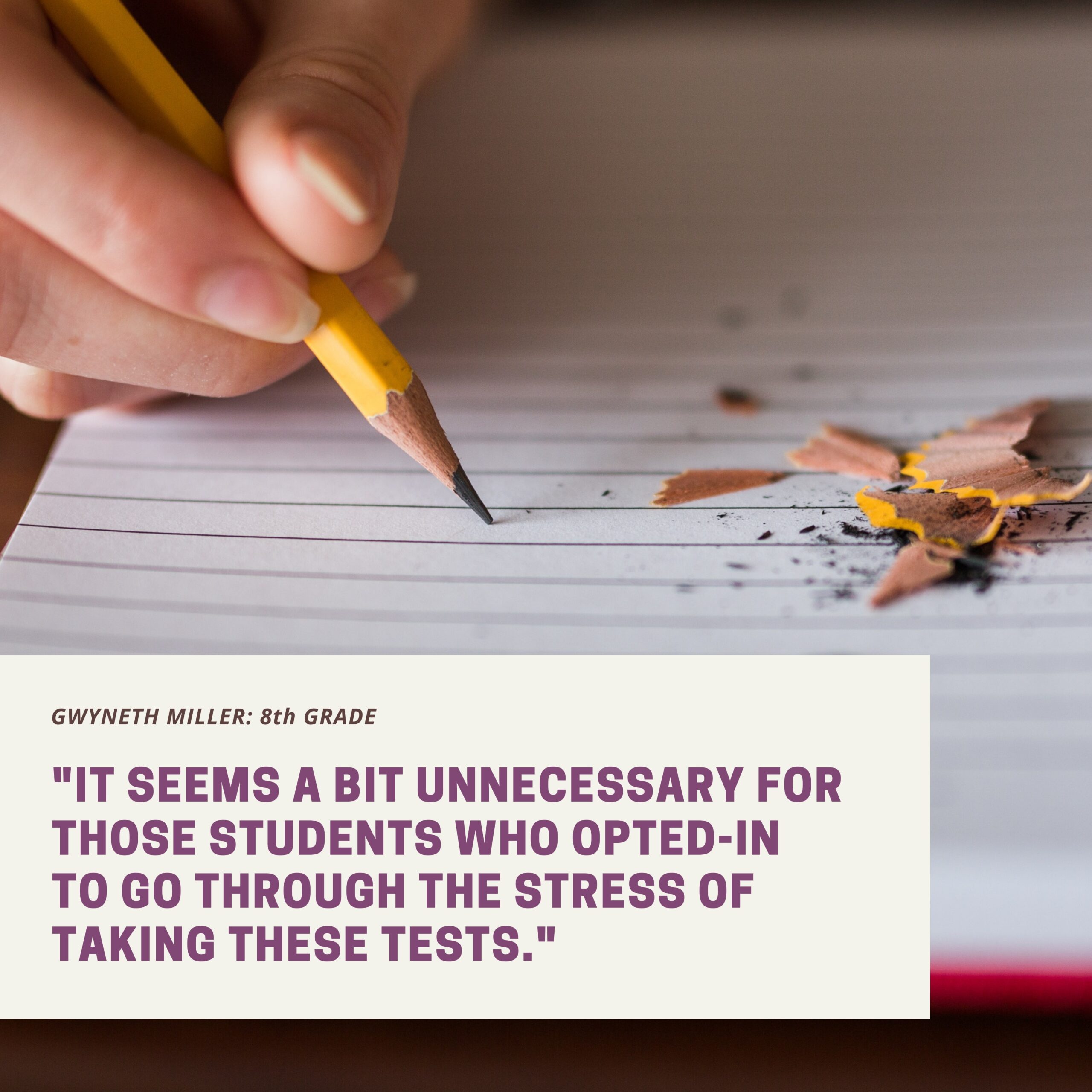
She believes her teachers have done a great job teaching despite the difficulties of this year. However, they still have not had enough time to gain all the information needed for these tests. She says, “I think my teachers did absolutely everything they could to make sure that if the CAASPP tests were required this year we would feel prepared…” However, because of the modifications teachers needed to make to teach in a short time span, Miller along with many other students, didn’t get to “master a subject or a particular topic,” Miller states.
Miller appreciates that schools were given the option to take the test or not, but she sees the test as unfair to be given at this time.
Mrs. Yvonne Baker, a regular and Honors math teacher at Green Acres Middle School does not think it is fair to be giving the CAASPP test this year. Baker only sees her students about 40% of the “normal” class days along with shorter class periods. She also is worried about students’ mental health and self-esteem when taking this test.
Baker, along with other teachers has done their best to prepare students, however, “what we think is essential may or may not match what is on the CAASPP,” says Baker. Teachers were not informed on in-depth details about what the content on the CAASPP will be, so they were not able to fully prepare their students.
Baker is not concerned about how the test may reflect on her as a teacher simply because “50% of the students were not engaged in the lessons during distance learning, so [she] know(s) the test results are not a true reflection of [her] teaching abilities,” states Baker.
Baker is glad the test is now an opt-in and will occur on Wednesdays because now she won’t be losing valuable teaching time, “Students have already lost out on valuable instruction from their teachers. I did not want to lose two to three weeks of instruction just for this test,” says Baker.

Unlike other teachers, Baker actually recommends her students not to take the test, “I feel that it is a waste of their time considering the year we have had,” states Baker. However, if students do choose to take it, Baker says students shouldn’t feel discouraged if they do poorly given they haven’t had the proper form of education this year.
Mrs. Tiffanie Cardoso, a regular and Honors English teacher at Green Acres Middle School, also doesn’t think it is fair for students to take the CAASPP this year, “Students have lost more than a year of education needed to perform well on the test,” says Cardoso. She continues, “…students are dealing with many social and emotional issues they may have never encountered before due to COVID,” and taking the CAASPP is the last thing students should do.
Plus the lack of time Cardoso was given due to the hybrid and distance learning schedule, she hasn’t had enough time to prepare her students enough for the test.
With the CAASPP test being an option this year, Cardoso believes that is the fairest it could be. If students are in the right headspace to take the exam, then Cardoso would encourage them to take it and would be curious to see their scores. She would also like to get some insight into the students she would be getting next year to see where they are. However, if the stress of the test would be too much for students, she would not recommend it, especially with the circumstances of this year.
By request, an anonymous 5th and 6th grade teacher from Global Learning Charter School does not believe taking the CAASPP test is fair this year. With the many changes this test has had, it doesn’t seem equitable at this time for students to take, “The district wants all of us to focus on social-emotional learning. Having us administer the CAASPP is contradictory to that,” they say.
Teachers have not had the time they need to fully prepare their students for this test. Since the beginning of the school year, and the recent transition to in-person instruction, teachers have been reviewing past year’s material, and haven’t had the opportunity to move forward with new instruction.
Middle, high, and elementary schools are all conducting the CAASPP test as an opt-in, opt-out situation. This is mainly the parent’s decision. However, this anonymous teacher does not recommend their students to take it.
HIGH SCHOOL
In-person juniors, Eric Chavez and Bethany Wells get first-hand experience on what teaching in the classroom looks like. With nearly half of the school year being over Zoom, students have not gotten the full learning experience needed to be prepared for the CAASPP tests.
Chavez understands why the district is still having the CAASPP happen, however, he doesn’t think students, himself included, are quite prepared for it. He says, “I do not think it will be a fair evaluation of students themselves because they were not able to learn as they normally would on campus the whole year.”
While students are given the choice to either opt-in or opt-out of the test, the real question is who are the students choosing to take a test that doesn’t affect their grade?
Chavez is one of the many students choosing to opt out of the test. He feels he is not quite prepared enough to show off what he has learned thus far in the year and is also stressed enough with the AP tests he has yet to take, as well.
Chavez believes students should worry about their core classes and graduation credits rather than a test most students have been advised no to take. He wishes VUSD would consider more of the aspect of students’ mental health and evaluating their academics generally. “The recent implication of mental health learning on Advisory days are a great step in the right direction,” says Chavez.
Similar to Chavez, Bethany Wells ’22, another in-person student, believes taking the CAASPP now is unnecessary. She says, “I think that the test is normally a good thing and helps the state know what’s going in schools, but this year was obviously very different…” She continues, “states already know the performance on these tests will be lower due to the shut down of schools.”
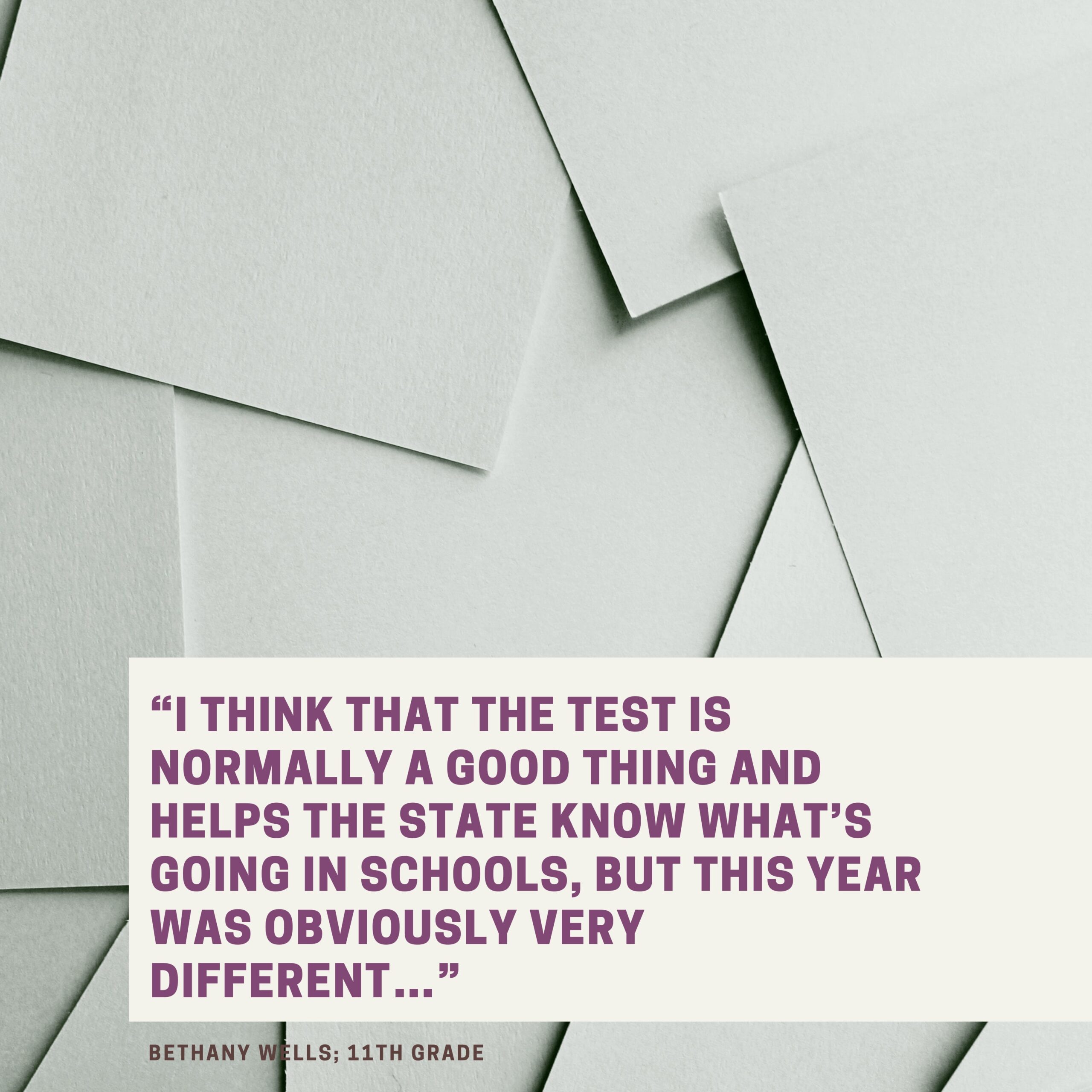
Like Chavez, Wells is also very busy with her own homework and classwork and doesn’t want to have to add another optional test to her worries. On the Wednesdays the CAASPP tests will be held, Wells has other work she has to complete, “The CAASPP does not affect my grade, but the other homework and assignments do,” she says.
Wells believes that some students may be prepared for this test, but there are others who aren’t due to the fact bigger lessons were cut out of the curriculum to fit other information in during the time-restricted classes. She says, “I think it’s unwise and unfair to make kids take a test with a bunch of things they haven’t learned.”
There are also the students who made the choice to stay distanced learning that still have the option to opt-in to the test. However, if they chose to, they would have to come in person to take it.
Distance learner Nizhoni Kears ’22, also believes taking the test at this time is not realistic. From her position of being at home, Kears says, “it’s unrealistic to ask students to come in person, especially considering most distance learners are at home for safety reasons…”
Kears is choosing to not opt-in to the test because it would not benefit her, and it would take time away to work on her school work which is the priority.
Similar to Chavez and Wells, Kears doesn’t think it is fair for any student to be taking this test at this time. She says, “Students have just now returned back to school and are adjusting to the new schedule, and adding testing on top of that will be even more overwhelming.”
Another distance learner junior, Kylen Gray ’22, also doesn’t think taking this test is fair. Gray says, “I feel that everyone has been through enough stress going back to school, the CAASPP test only adds to the workload everyone has to complete at the moment.”
Gray is choosing to not opt-in to the test because it does not affect his grade.
11th grade AP English Language and Sophomore English 2 teacher, Mrs. Bethany Tolbert believes students this year have had less of a chance than students from previous years to prepare for this test. She knows some are capable and will do well, however, still have not had the same opportunity to prepare.
To prepare students who do choose to opt-in, Tolbert has done her best to keep her students “in the loop” for all of the recent updates for the test. Within days, many changes have occurred with the test, so it was very important for students to know new information regarding the test and when it was going to happen.
Teaching an AP class, Tolbert believes what she has done with her students all year should have prepared her students for the CAASPP. Although it has been a difficult transition from Zoom to in-person, Tolbert is confident that her students are ready to take it as what they do every day in class blends into the content of the CAASPP.
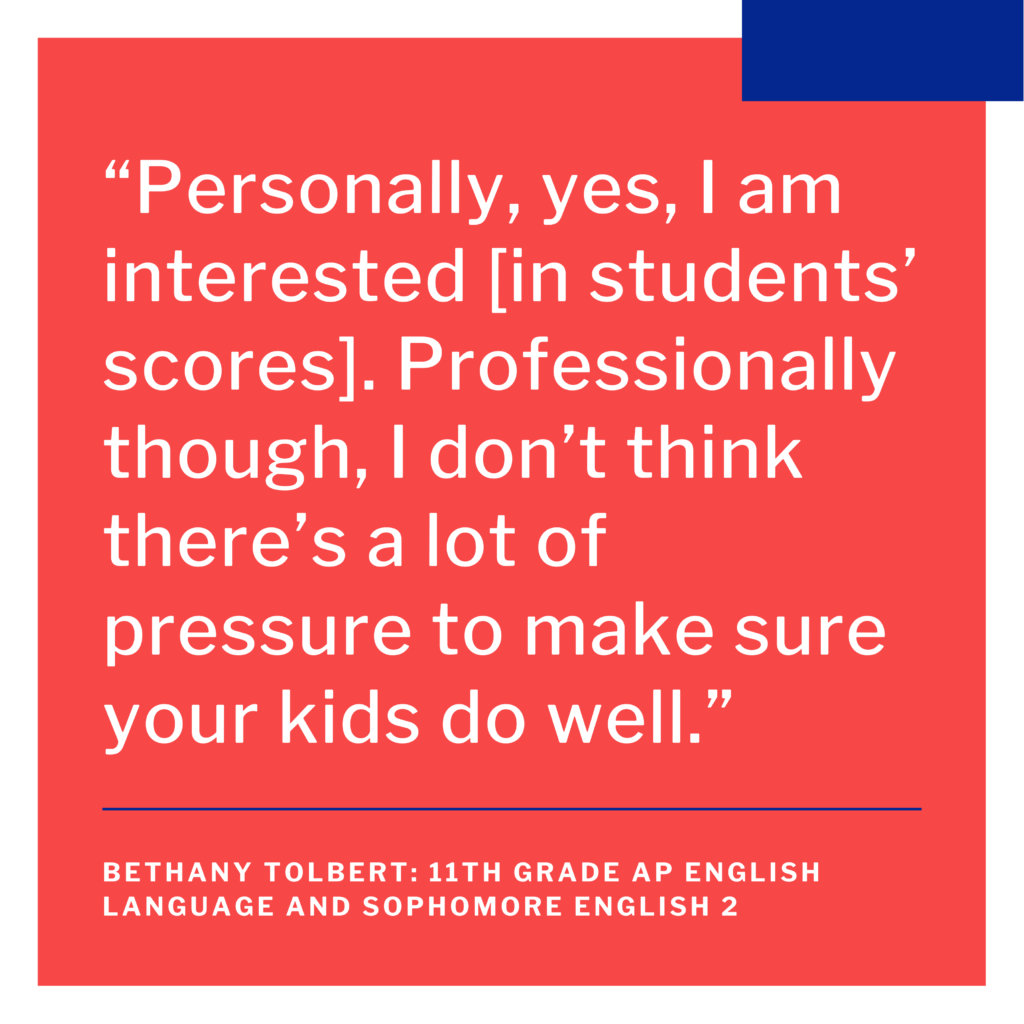
In terms of receiving students’ scores, Tolbert doesn’t feel any pressure on how well her students may do on the test. She believes it is merely a personal reflection of the student. However, she does want to see her students succeed and do well. She says, “Personally, yes, I am interested [in students’ scores]. Professionally though, I don’t think there’s a lot of pressure to make sure your kids do well.”
Given the current circumstances, Tolbert believes having the test be an opt-in is the best way to go about it. She realizes students will choose to opt-out for various reasons, however, there is not much teachers can do about that.
If students have the time and energy, Tolbert recommends her students take the CAASPP for the sake of personal reflection. However, if it causes anxiety, or other difficulties, that “…this is not the year to push yourself in regards to that. I would leave it up to personal reflection.”
Mother of an 11th grader, a 9th grader, and a 5th grader, Mrs. Saze Brammer believes the CAASPP is a necessary test to take no matter the circumstances as it is an assessment of where her kids are in terms of where her kids are in education.
She adds, “they [her kids] should be ready for it [the CAASPP]. They’ve been in school all this time, and so, if it’s an accumulative assessment of their knowledge up to this point, yes, they should be ready.” She continues that since this CAASPP doesn’t affect her kids’ grades, that there shouldn’t be any “nerves” about taking it, but ultimately just about doing their best.
Brammer believes if the test helps evaluate her child’s level, she recommends her kids to take the test, she says, “it doesn’t hurt anything to take it…”
She mentions that this test is also important for the sake of the school to see where their students are regarding if they’re learning the information they need. Meaning, if scores are low, that is a way for schools to improve some teaching strategies.
Brammer understands the load of schoolwork can get heavy. However, if her kids balance it out, their stress levels should be manageable.
Mother of an 11th grader, a 9th grader, and a 7th grader, Mrs. Mary Chavez is also the PTSA President for Ridgeview Middle School, where her 7th grader attends. Given the unfortunate circumstances of this year, Chavez gives her kids the option of whether they want to take the CAASPP or not. However, in a “normal” school year, she would “be all about testing because [she] thinks it’s important to be able to build that skill all the way through school,” she states.
Chavez adds that all state testing is an “opportunity to show off what you learned in the year,” as she believes it is a great chance to develop test-taking skills as students advance in education.
Personally, Chavez doesn’t care what the scores of the tests are for her kids, but merely “sends them off with just ‘do your best,’” she says.
Chavez is “very blessed” that her kids have stayed “engaged throughout this whole pandemic,” however she worries that they are still not prepared enough given this was not a regular school year putting “too much on their shoulders, so [she] doesn’t want the pressure of testing to be there,” Chavez states.
Overall, Chavez is concerned about youth today as the recent and sudden change to in-person has been difficult. However, her kids have had a positive reaction to it. However, she still worries about their mental health as testing can cause a lot of anxiety.
ADMINISTRATION
Juan Guerrero, the VUSD Board President, says that the “test has been shortened, but it still reflects grade-level material”. Since teachers have struggled to teach the same amount of content thanks to online learning, the CAASPP test will not be as long as in previous years.
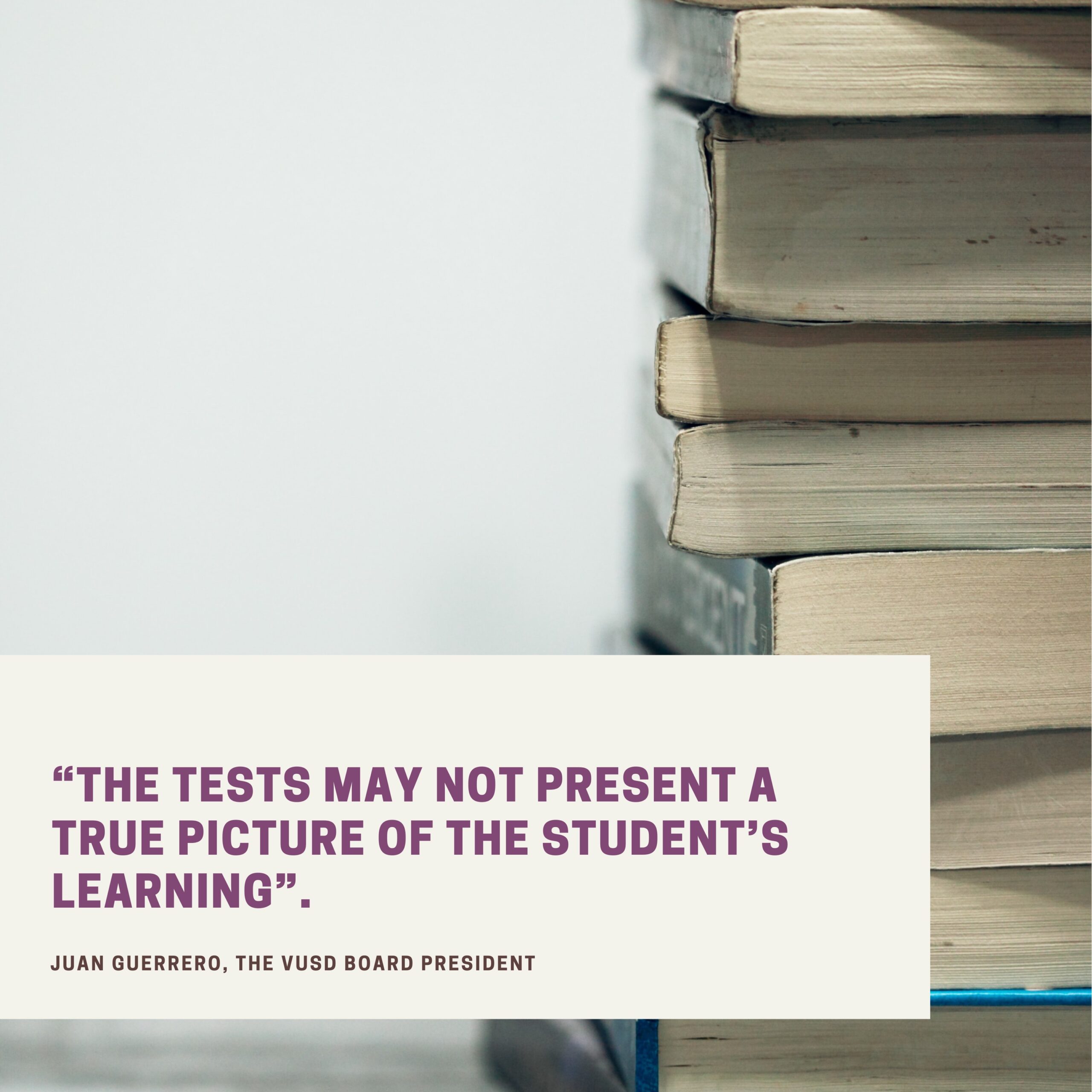
He makes it clear that although the test is now shorter, it is not necessarily easier compared to previous years.
Guerrero is currently unaware of the number of “students that will take the state tests”, but he and the rest of the VUSD Board are prepared to provide the test to all students who wish to take it.
The Board tries to remain patient with student’s home life, and understands that some students could experience “difficulties with online learning, and … connectivity issues”. Because of this, Guerrero expresses that, “the tests may not present a true picture of the student’s learning”.
The Board is aware that some “questions on the tests may not have been covered during class this year”, so they provided the following link, https://www.cde.ca.gov/ta/tg/ca/covid19assessmentfaq.asp, to help answer questions regarding the CAASPP test.
Dr. Jesus Gonzalez, who has a Ph.D. in education and is the vice-principal of Redwood High school, says that state testing is meant to act as a measuring guide and diagnostic tool to better instruction so the needs of the students can be met.
Dr. Gonzalez goes on to say, “I think for this year’s CAASPP testing, teachers have done their best to prepare students at the highest levels possible under the conditions that we’re in.”
Visalia Unified School District decided to make this year’s state testing an Opt-In rather than the usual Opt-Out strategy. Meaning that if you/your student wants to be tested, you have to consent for that to take place.
Dr. Gonzalez says that with this development, “there will definitely be a lot fewer students this year deciding to take the test compared to regular years.” At the time of the interview, the exact number of students opting into state testing was unknown.
State testing will take place on multiple Wednesdays in the style of one Wednesday being for English testing and one for Math.
The CAASPP test for English and Math has been reduced compared to previous years.
Dr. Gonzales also says that students will not have teacher-instructed reviews for testing this year due to not every student taking the test and the complexities that would ensue for teachers if they were to review.
Testing will be taking place on campus only. Dr. Gonzalez says that testing will occur on Wednesdays from 8:30 A.M to 12:30 P.M, and attending state testing will count for your advisory attendance.
Abigail Miller
Abigail Miller '22 is currently a fourth-year member of the Redwood Gigantea. As the Government & Politics page editor, lead photographer, and photography editor, she has published over 100 photo galleries capturing Redwood's most memorable moments. She owns her own photography business, Abigail Miller Photography, which you can find in the link below.
https://abigailmiller.zenfolio.com
Tags: covid 19, Green Acers, Redwood, vusd

